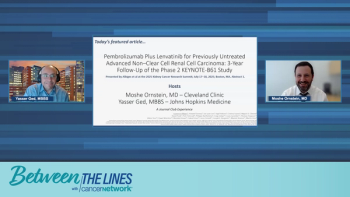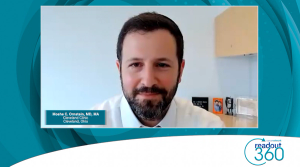Articles by Moshe Ornstein, MD, MA

Panelists discuss how pembrolizumab plus lenvatinib has established a new benchmark and become the preferred first-line treatment option for more than 95% of patients with non–clear cell renal cell carcinoma (RCC), according to national guidelines, demonstrating activity across all major histological subtypes despite the heterogeneous nature of these diseases, while acknowledging that specific rare histologies may still require tailored approaches.

Panelists discuss how managing the safety profile of pembrolizumab plus lenvatinib requires proactive patient education and early toxicity identification, with approximately 25% of patients discontinuing therapy due to adverse events in both clinical trials and real-world practice, emphasizing the importance of distinguishing between tyrosine kinase inhibitor (TKI) and immunotherapy-related adverse events for appropriate management.

Panelists discuss how the KEYNOTE-B61 study demonstrated impressive survival outcomes with a median progression-free survival (PFS) of 17.9 months and median overall survival (OS) of 41.5 months, effectively doubling the historical tyrosine kinase inhibitor (TKI) monotherapy benchmarks of 8 to 9 months PFS and 21 months OS in patients with non–clear cell renal cell carcinoma (RCC).

Future Directions in nccRCC
ByThomas Hutson, DO, PharmD, PhD, FACP,Moshe Ornstein, MD, MA,Arnab Basu, MBBS, MPH, FACP,Andrew Hahn, MD Panelists discuss the ongoing challenges and progress in treating non–clear cell renal cell carcinoma (nccRCC), emphasizing the need for subtype-specific trials, mechanistically driven therapy, and international collaboration to move beyond data extrapolation from clear cell RCC (ccRCC) and toward truly evidence-based, personalized care.

Future Directions in ccRCC
ByThomas Hutson, DO, PharmD, PhD, FACP,Moshe Ornstein, MD, MA,Arnab Basu, MBBS, MPH, FACP,Andrew Hahn, MD Panelists discuss the future of clear cell renal cell carcinoma (ccRCC) treatment, focusing on optimizing sequencing and combinations of existing therapies, integrating novel agents like belzutifan and cellular therapies, and advancing research through clinical trials and investigator-led studies to drive more personalized and effective care.

Panelists discuss how the durability of response data was particularly compelling, with a median duration of response of approximately 2 years and 35% of patients maintaining responses at 3 years, especially noting the surprising 31% response rate in chromophobe renal cell carcinoma (RCC) despite this histology's historically poor responsiveness to immunotherapy due to low tumor mutational burden.

Panelists discuss how the KEYNOTE-B61 study demonstrated remarkable efficacy with a 50.6% objective response rate and 82% disease control rate across all non–clear cell renal cell carcinoma (RCC) histologies, representing a significant improvement over historical tyrosine kinase inhibitor (TKI) data that showed response rates below 30% and setting a new treatment benchmark for this patient population.

Role of Biomarkers
ByThomas Hutson, DO, PharmD, PhD, FACP,Moshe Ornstein, MD, MA,Arnab Basu, MBBS, MPH, FACP,Andrew Hahn, MD Panelists discuss the ongoing challenge of lacking reliable biomarkers in renal cell carcinoma (RCC), emphasizing promising advances in RNA expression signatures and emerging tools like protein biomarkers and circulating tumor DNA (ctDNA) to personalize treatment and improve real-time therapy decisions despite current limitations.

Adverse Event Management Strategies in Renal Cell Carcinoma
ByThomas Hutson, DO, PharmD, PhD, FACP,Moshe Ornstein, MD, MA,Arnab Basu, MBBS, MPH, FACP,Andrew Hahn, MD Panelists discuss the nuanced approach to adverse effect management in non–clear cell renal cell carcinoma (nccRCC), highlighting a shift from aggressive toxicity management in the first-line setting aimed at prolonging survival to a patient-centered focus on quality of life and tolerability in later lines, emphasizing open communication and long-term treatment endurance.

Panelists discuss how the KEYNOTE-B61 study population truly represents real-world clinical practice, with papillary renal cell carcinoma (RCC) being the most common subtype followed by chromophobe, unclassified, and translocation RCC as the top 4 subtypes typically encountered in clinic, while rarer variants comprise only 2% to 3% of non–clear cell cases.

Clinical Experience in Treating nccRCC (Patient Case 2)
ByThomas Hutson, DO, PharmD, PhD, FACP,Moshe Ornstein, MD, MA,Arnab Basu, MBBS, MPH, FACP,Andrew Hahn, MD Panelists discuss the complex management of papillary renal cell carcinoma (RCC) after first-line progression, focusing on balancing effective second-line therapies like lenvatinib plus pembrolizumab with quality of life, the role of multidisciplinary care and surgery, the importance of close monitoring, and the critical need for clinical trial enrollment and genomic profiling to guide personalized treatment.

Panelists discuss how the KEYNOTE-B61 phase 2 single-arm study represents the largest prospective trial evaluating pembrolizumab plus lenvatinib as first-line treatment for advanced non–clear cell renal cell carcinoma (RCC), enrolling 158 patients across all major histological subtypes with an impressive median follow-up of 41.6 months and updated 3-year survival data.

Panelists discuss how non–clear cell renal cell carcinoma (RCC) represents a challenging, heterogeneous collection of rare tumors comprising 25% to 30% of all RCC cases, requiring careful histological review and individualized risk stratification based on tumor biology, disease tempo, and burden rather than traditional treatment algorithms used for clear cell RCC.

Panelists discuss how they will review the KEYNOTE-B61 phase 2 study examining pembrolizumab plus lenvatinib for previously untreated advanced non–clear cell renal cell carcinoma (RCC), including an overview of non–clear cell RCC and integration of the 3-year follow-up data into clinical practice.

Overview of the Second-Line nccRCC Treatment Landscape
ByThomas Hutson, DO, PharmD, PhD, FACP,Moshe Ornstein, MD, MA,Arnab Basu, MBBS, MPH, FACP,Andrew Hahn, MD Panelists discuss the challenges of treating non–clear cell renal cell carcinoma (nccRCC) after first-line progression, emphasizing the limited second-line options, the emerging use of immunotherapy (IO) and combination regimens, the need for subtype-specific strategies, and the critical role of clinical trial enrollment to advance care in this heterogeneous disease.

Overview of the First-Line nccRCC Treatment Landscape
ByThomas Hutson, DO, PharmD, PhD, FACP,Moshe Ornstein, MD, MA,Arnab Basu, MBBS, MPH, FACP,Andrew Hahn, MD Panelists discuss recent advances in non–clear cell renal cell carcinoma (nccRCC) treatment, highlighting the emerging role of immunotherapy plus tyrosine kinase inhibitor (TKI) combinations—particularly lenvatinib and pembrolizumab—in improving response rates, progression-free survival, and overall survival across diverse subtypes, while emphasizing individualized care and proactive management.

Clinical Experience in Treating ccRCC (Patient Case 1)
ByThomas Hutson, DO, PharmD, PhD, FACP,Moshe Ornstein, MD, MA,Arnab Basu, MBBS, MPH, FACP,Andrew Hahn, MD Panelists discuss the challenges of managing intermediate-risk metastatic clear cell renal cell carcinoma (ccRCC) after progression on first-line immunotherapy (IO)/tyrosine kinase inhibitor (TKI) therapy, emphasizing cabozantinib’s role, individualized dosing strategies, proactive toxicity management, and the importance of patient-centered care to optimize long-term disease control and quality of life.

Overview of the Second-Line ccRCC Treatment Landscape
ByThomas Hutson, DO, PharmD, PhD, FACP,Moshe Ornstein, MD, MA,Arnab Basu, MBBS, MPH, FACP,Andrew Hahn, MD Panelists discuss evolving second-line treatment strategies for clear cell renal cell carcinoma (ccRCC), emphasizing the impact of first-line regimens, the growing role of tyrosine kinase inhibitors (TKIs) and emerging combinations, and the need for clinical judgment in sequencing therapies to balance disease control, symptom management, and patient quality of life.

Treatment Management Strategies
ByThomas Hutson, DO, PharmD, PhD, FACP,Moshe Ornstein, MD, MA,Arnab Basu, MBBS, MPH, FACP,Andrew Hahn, MD Panelists discuss the shift toward a more personalized approach in metastatic renal cell carcinoma (RCC) management, highlighting the evolving role of risk stratification, the renewed interest in immune checkpoint inhibitors for favorable-risk patients, and the strategic integration of systemic therapy, active surveillance, and surgical interventions to optimize long-term outcomes.

Overview of the First-Line ccRCC Treatment Landscape
ByThomas Hutson, DO, PharmD, PhD, FACP,Moshe Ornstein, MD, MA,Arnab Basu, MBBS, MPH, FACP,Andrew Hahn, MD Panelists discuss current strategies for first-line treatment sequencing in renal cell carcinoma (RCC), emphasizing immunotherapy-based combinations tailored to disease burden and patient characteristics, while highlighting the importance of multidisciplinary care, real-world experience, and clinical trial data in guiding personalized, patient-centered decisions.

Best Treatment Selection in Clear-Cell RCC
ByMoshe Ornstein, MD, MA,Karine Tawagi, MD,Hans Hammers, MD,Mahdi Taha, DO, FACOI, FACP,Nataliya Mar, MD Medical experts describe the decision-making process between choosing an IO-IO vs an IO-TKI regimen for first-line treatment, considering factors such as safety profile and response in both community and academic settings.

NCCN Guideline Updates in Clear-Cell RCC
ByMoshe Ornstein, MD, MA,Karine Tawagi, MD,Hans Hammers, MD,Mahdi Taha, DO, FACOI, FACP,Nataliya Mar, MD Medical experts will discuss the updated NCCN guidelines favoring ipilimumab + plus nivolumab for patients with favorable risk, including the data supporting this change and its the potential impact on the disease landscape.

KEYNOTE-564: Pembrolizumab as Adjuvant Therapy
ByMoshe Ornstein, MD, MA,Karine Tawagi, MD,Hans Hammers, MD,Mahdi Taha, DO, FACOI, FACP,Nataliya Mar, MD Medical experts examine how overall survival data from KEYNOTE-564 has influenced the use of pembrolizumab as adjuvant therapy.

AE Management of IO/TKI and Future of nccRCC
ByMoshe Ornstein, MD, MA,Karine Tawagi, MD,Hans Hammers, MD,Mahdi Taha, DO, FACOI, FACP,Nataliya Mar, MD Medical experts discuss significant adverse effects of TKIs and IOs, including management and patient education, and highlight exciting pipeline therapies for non–clear cell RCC, such as Ipi + Nivo and zanzalintinib + Nivo.

Role of Histology and Data in Selecting Optimal Therapy in nccRCC
ByMoshe Ornstein, MD, MA,Karine Tawagi, MD,Hans Hammers, MD,Mahdi Taha, DO, FACOI, FACP,Nataliya Mar, MD Medical experts explore how non–clear cell RCC histology impacts treatment selection, addressing challenges with less common subtypes vs more frequent ones, and discuss how clinical data and experience inform treatment sequencing and shared decision-making.

nccRCC: Alternative Therapies
ByMoshe Ornstein, MD, MA,Karine Tawagi, MD,Hans Hammers, MD,Mahdi Taha, DO, FACOI, FACP,Nataliya Mar, MD Medical experts discuss clinical trials supporting alternative therapies for advanced non–clear cell RCC, including Cabo alone, Nivo + Cabo, and others, and whether these studies covered all histologies.

KEYNOTE-B61: Clinical Implications of Efficacy and Safety Data in Practice
ByMoshe Ornstein, MD, MA,Karine Tawagi, MD,Hans Hammers, MD,Mahdi Taha, DO, FACOI, FACP,Nataliya Mar, MD Medical experts review long-term data from the KEYNOTE-B61 trial on pembrolizumab and lenvatinib, compare its efficacy and safety across non–clear cell RCC subtypes, and discuss dose management and safety relative to the CLEAR trial.

Non–clear Cell RCC: First-Line Treatment Options and Guideline Updates
ByMoshe Ornstein, MD, MA,Karine Tawagi, MD,Hans Hammers, MD,Mahdi Taha, DO, FACOI, FACP,Nataliya Mar, MD Medical experts outline the current first-line treatment options for advanced non–clear cell RCC, including the factors influencing agent selection, as well as discuss how recent NCCN guideline updates and label changes affect treatment decisions in community practice.

Challenges in Treating RCC From Community and Academic Settings
ByMoshe Ornstein, MD, MA,Karine Tawagi, MD,Hans Hammers, MD,Mahdi Taha, DO, FACOI, FACP,Nataliya Mar, MD Medical experts explore the main challenges in treating non–clear cell RCC compared with clear cell RCC, discussing how these difficulties vary between community and academic settings.

Overview of RCC: Clear-Cell and Non–clear Cell
ByMoshe Ornstein, MD, MA,Karine Tawagi, MD,Hans Hammers, MD,Mahdi Taha, DO, FACOI, FACP,Nataliya Mar, MD Medical experts give an overview of renal cell carcinoma (RCC), detailing the differences between clear cell and non–clear cell subtypes, the various forms of non–clear cell RCC, and the demographic and risk factor profiles associated with each subtype, while also discussing how histological differences influence prognosis.








